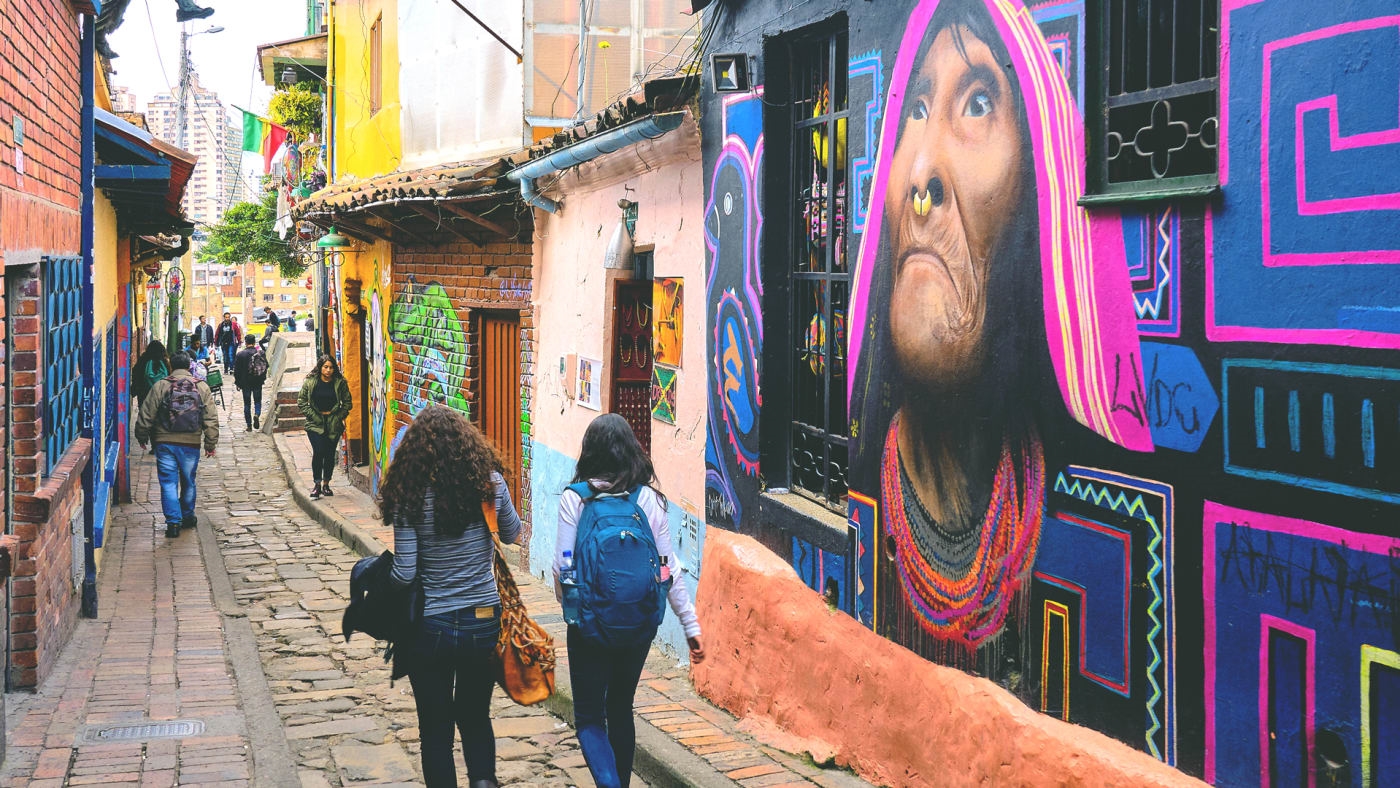10 digital nomads share how they stay focused working abroad
I’m writing this article from a call booth in Bogota, Colombia—headphones on, volume all the way up—to drown out the celebration for the football team in the main area of the local WeWork. This month, I’ll work from here, pitching, researching, and writing around 60 articles a month. But in January, I worked from a poolside workspace in Chiang Mai, Thailand. And last September, I logged hours from the garden of K10 Coworking in Prague, which decades ago was a Swedish ambassador’s home.
I wasn’t always a gypsy journalist, but almost a year ago, I quit my full-time gig in New York City, rented a storage unit, and bought a one-way ticket to Croatia. Since then, I’ve continued to develop my freelance career while changing locations each month—from Lisbon to Japan, Thailand to Buenos Aires—and the list goes on.
While it is a lifestyle many people dream of, it isn’t as rose-colored as my Instagram would lead you to believe. Battling the stress of different time zones, jet lag, and the constant temptation of FOMO as you transit between cities, countries, and continents makes it difficult to stay focused, be present in meetings, and deliver quality work. To do the travel-and-work tango, though, digital nomads across various industries have developed strategies for soaking up the world while retaining their employment.
If you’ve considered taking the leap to try remote work, take a page out of the professional passports of these successful nomads, who have mastered the craft:
Find a way to hold yourself accountable when there’s no boss looking over your shoulder
For designer and illustrator Nicole Roberts who is on her 14th month of travel in Buenos Aires, Argentina, leveraging her compulsions helps her zero in. She loves lists, and sets priorities each night for the next day. To hold herself accountable she uses the app Habitica. This game-like structure rewards her for completing a task—and disciplines her when she falls short. “These little virtual incentives and punishments actually teach me do more and stick to my intentions. It might be silly, but it is effective,” she says.
Be strategic with your ‘yes’—and comfortable with your ‘no’
For three-year digital nomad and staff software engineer Mark Meyer, it was important to become strategic with his free time. While his paycheck fuels his travels—making it necessary to get comfortable saying ‘no’—agreeing to adventures is part of why he chose this lifestyle, so 24/7 work isn’t an option, either. “Without having the cues of an office for what times to start and stop working, it’s very easy to feel like you should always be working, and sometimes it’s necessary to say ‘yes’ to that crazy fun thing,” he shares. “In the end it’s all about balance—and finding how to be self-reliant.”
Find consistency in the inconsistency
For those who take one to two vacations a year, the thrill of touching down in a new city means a week of email-free adventuring, eating every last local dish they can find, and sleeping in. But when digital nomads arrive at their next pit stop, it’s time to set up shop. How is the Wi-Fi? Where’s the best coworking space? Can I make calls? What’s the language, again? And the time? Nothing is consistent about constant travel—from the dialect to the routers and the outlets—so building some sort of normalcy is key to focusing. Organizational psychologist and speaker Laura Gallaher, who has been on the road for five months and is currently living in Croatia, seeks a few must-haves every time she moves. “I have a consistent practice of finding a meditation spot, finding a favorite local restaurant, finding a grocery store, and learning how things work in my apartment. Everywhere I go, I know that is my routine. The consistency can help me cope with the anxiety of the unknowns that could otherwise interfere with my productivity,” she shares.
And since you’re bound to have a few work and travel fails as you adjust to a new culture and dynamic, Gallaher also stresses the value of self-compassion. “The more time you spend beating yourself up or stressing about these barriers, the less productive you will be. When you practice self-compassion, you immediately bypass the emotional hurdles associated with the challenges you face,” she says.
Don’t sleep in—and use your Sundays
For those who are location-independent and freelance contractors, there is no designated time to be online and working. That said, there is also no set schedule of workdays, making them fluid. Though those who thrive on structure might feel uncomfortable without predictable working times, for product marketer Jonathan Moed, who has been traveling since November, adopting a “never waste a Sunday” mind-set has proved beneficial. That—and not sleeping in. “With more flexible work hours comes more responsibility to actively manage a work-life calendar. Waking up early allows me to take care of anything urgent early in the day, be it personal or professional,” he says.
And since different countries have various perspectives toward Sundays, with many restaurants or shops closed on that day, he uses that time to capitalize on head-down work. “I lay out a schedule and research any events happening in my city that week, like concerts or tours. I find it helpful to take control of my upcoming week on Sunday, so that when these new developments arise, I know what I can and can’t move around to make room for them.”
Don’t be bound by hours—but led by inspiration
Ever have one of those days in the office where everything feels like a chore? Emails, meetings, client calls—ugh, nothing comes easy. SEO strategist Drew Butler, who is on month 11 of traveling, experiences this on the road, too. After all, it isn’t just your surroundings that impact your inspiration; sometimes you just wake up on the wrong side of creativity. When the juices do flow, though, Butler digs in: “To take advantage of the flexibility of remote work, I have to capture the motivation when it comes to me. Sometimes that means working 12 hour days on a project I feel strongly about, so that I can take time off in the middle of a weekday,” he explains.
Schedule time by yourself
For many professionals, coworking spaces are a double-edged sword of productivity: Seeing folks diligently cram away next to you is motivating, but when they pull off the headphones to bounce an idea off of you, it can mess up your rhythm. While founder of a full-service web development company for female entrepreneurs Jessica Tatham sometimes feeds off the presence of company, other times, spending time alone is what helps her power through her to-do list. As she’s traveled the past 11 months, she’s figured out how to schedule blocks for solo strategy.
“Even though I currently travel with several people, I’m an introvert at heart, and need time alone to process and get through my work. When I really need to give a client my full attention, I work from home instead of a coworking space, get in comfortable clothes, and double-down,” she explains. This ensures her work is completed, so she can spend more time taking a food tour, meeting up with locals at a nomadic networking event, or catching a flight.
Try to match your company’s hours—but set some parameters
When you’re living in Asia but the majority of your clients or your company are on the U.S. East Coast, sleep becomes scattered between various naps throughout the day and night. It isn’t an easy routine to adjust to, but marketing and research coordinator Hilary Welter says staying online keeps her compatible and cohesive with those in the U.S. She’s mastered the art of overlapping hours, considering she’s been traveling for two years—and even has a few exceptions now. “I’ve found that working on the same time zone as office headquarters just makes things easier for everybody when it comes to communication and deadlines,” she explains. “When you don’t have an office to physically leave, work is always with you. Whether you’re working days, nights, or somewhere in between, stick to some kind of work schedule so you leave time to enjoy life.”
Set aside time to work offline
Take a quick audit of your browser and its history. How often have you visited Facebook today? And are you up to date on those Instagram stories? Where there is internet, there are distractions, which is why interactive designer Claudia Monroy schedules offline time to focus. One and a half years into the digital nomad life and currently calling Split, Croatia, home, these Wi-Fi-free times keep her from being tempted by social updates or incoming emails. And while it might seem like a no-brainer, ensuring she sleeps enough each night makes a difference, too: “Sounds obvious, but it’s so easy to give up sleep to go explore and keep working, but a rested mind is way more productive. Even if the work session ends up being shorter, it’ll be more effective,” she says.
Take a day off
While not every type of digital nomad employment allows days off, if you can swing it, freelance photographer Sean Marier says having a day to explore not only ensures he is focused once he returns to work, but provides fodder for his work. He’s been traveling on and off since April 2017, and currently lives in Chiang Mai. And when you relieve yourself from duties, really check out, he says. “I schedule at least one day a week where I don’t touch my camera, edit any pictures, or even scroll though my Instagram feed,” he shares. “This allows me to avoid burnout and come back recharged without any passion lost to the workhorse devil perched on my shoulder.”
Stay active
You already probably know how difficult it is to make it to the hotel gym to work up a sweat on vacation. Now, consider traveling for months—or years. Between taking tours, side trips to different destinations, working, sleeping, and meeting new folks—going for a run or taking a boxing class in a foreign language is a stretch, right? Fitness, though, can do wonders for your mental performance, according to global senior manager for leadership development Anne-Madeline Kleinwachter. She’s on month 11 of travel, and somehow, between all of the takeoffs, landings, and turbulence, she’s managed to stay active. “Physical exercise is very often underestimated. From my experience, it plays a huge role in staying healthy, both physically and mentally. I like it most when it is fun, which means for me a great balance of yoga and gym and/or outdoor classes with a lot of music,” she shares. For Kleinwachter, paying attention to her needs and taking breaks—for working out or other tasks—means the difference between productivity and laziness. “There are always plenty of opportunities, but in the end it is most important to find yourself. Be grateful, enjoy the journey, and embrace every little moment,” she says.
(37)



